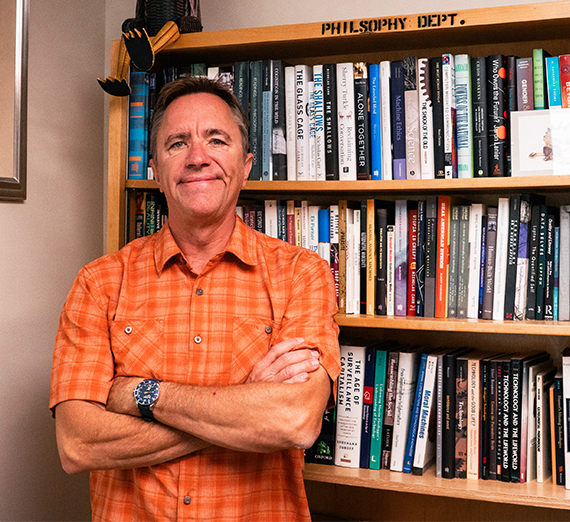Q&A: Professor Besmer talks Phi Beta Kappa

An honor as old as the United States itself.
After a years-long effort by faculty, staff and administrators, the Phi Beta Kappa society voted this summer to establish a chapter at Gonzaga. The University is now one of less than 300 notable schools across the country recognized for their academic excellence.
Kirk Besmer, professor of philosophy and one of only a handful of existing society members on campus, steered the application process through what he describes as a “series of trials and errors.”
Responses have been edited for length and clarity:
Spirit: What is the Phi Beta Kappa Society and why is this recognition important?
Besmer: Phi Beta Kappa is the oldest and most prestigious academic honor society in the U.S. It was founded in 1776 as the original honor society that others have modeled themselves after. It’s important because it means Gonzaga is recognized amongst the best universities in the country, particularly for our central focus on the liberal arts and sciences. That’s what we’ve been doing all along, but we have now a national body that says, “You have been doing this very well, and we will bestow this honor on you in the understanding that you’ll continue to do that.”
As for the University as a whole, this helps position Gonzaga in a competitive higher education market.
Spirit: Who worked to make this dream a reality?
Besmer: The University cannot apply for a chapter. The application must be initiated by Phi Beta Kappa faculty. I am a member of the society, that’s why I spearheaded the application along with Paul DePalma, professor of computer science. But it was really a team effort. President Thayne McCulloh has been a steadfast supporter, and we could not have done it without him. The Office of the Provost – starting with Deena González, Sacha Kopp and now Mia Bertagnolli – has been unstinting in what they’ll do for us. Everybody on campus who could contribute has been incredibly supportive and enthusiastic. I went to these people, hat in hand, asking for them to dedicate staff and time to this project and they willingly did, knowing it’s an institutional goal and that it’s been a part of the broader strategic plan for a long time.
Spirit: How do the values of the society align with Gonzaga’s mission as a Jesuit institution?
Besmer: The main function of the Phi Beta Kappa Society is to advocate for the liberal arts and sciences as a central pillar to undergraduate education. At Gonzaga, those are central to the University’s core curriculum. And the basic idea of a Jesuit institution is that education is formation, and that a Gonzaga education changes you as a person. It develops you as a whole person. The same is true of Phi Beta Kappa. The society believes an education with the liberal arts and sciences as a central tenant creates different kinds of people. You live a different life as a person who has studied widely and deeply in those fields. That idea of education as transformation really aligns with Gonzaga’s mission.
Spirit: What does a Phi Beta Kappa chapter do?
Besmer: Every year there will be an induction ceremony, and the University will induct roughly 10% of the graduating class from the College of Arts and Sciences. We haven’t fully determined how that top percentage will be determined, but we know we’ll want to induct students who have demonstrated intellectual curiosity that led them to study broadly and deeply within the arts and sciences. We’ll also continue the Phi Beta Kappa lecture series that has come to campus the past few years. Typically, a nationally recognized scholar comes to speak on campus. The idea is to give back to our colleagues and students, to show them why this chapter matters.
Spirit: What does this mean for Gonzaga, specifically for students, going forward?
Besmer: For students who are inducted, there are practical benefits – it is a great thing to have on your resume. But I think about the kinds of students for whom this really matters, like first-generation students or veterans or students from underrepresented backgrounds. These are students for whom college was not necessarily in the cards. By receiving this honor, they start to imagine a different future for themselves. Somebody they respect is saying, “You are a nationally recognized scholar.” That can really impact people.
